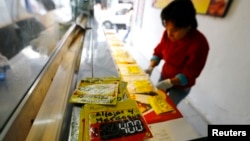When Betty Villalta opened her bakery in a working-class neighborhood of Santiago four years ago, she thought her business was pretty much recession proof.
But in recent months she has been selling pastries in the street to keep the money coming in as bread sales have slid and flour prices have risen. Three businesses on her street have closed their doors this year.
"They say food, and especially bread, is something people need, that it has to be eaten. But that's not the reality, now they are even saving on bread," she said.
Villalta is not alone. When mining investment first began to cool in top copper exporter Chile last year, consumer sales remained robust. But now the slowdown is being felt hard in the wider economy, compounded by a weaker peso currency that means the cost of imported goods has risen.
Last month, data showed consumer sentiment turned negative for the first time in two years, sales of new cars have tumbled and retail sales growth has decelerated from double digits a year ago to an anemic 2.3 percent.
Most economists now predict overall growth in Chile's economy of between 2.0 and 2.5 percent this year, down from 4.1 percent in 2013.
"There is evidently a pretty big deceleration," said Bernadita Silva from Chilean retail business chamber CNC.
"There are two things going on: people are buying less, they are definitely buying less, that is clear, and in supermarkets perhaps they are substituting or looking for other channels, like going to a market."
Copper Reliance
Many of Latin America's commodities-reliant economies have struggled this year, hit by worries about Chinese growth and the withdrawal of U.S. monetary stimulus.
In recent years, bond-buying by the U.S. Federal Reserve and international low borrowing rates helped fuel gains in commodities like copper as investors sought alternatives to low-yielding assets. A more recent recovery of the U.S. economy and tighter monetary policy is reversing this effect.
Chile, one of the region's most developed and open economies, is particularly susceptible to these factors.
Its income is heavily dependent on the veins of copper that snake under its arid, high-altitude Andean north. Of the around $77 billion of goods Chile exported in 2013, over $40 billion was in copper, according to central bank figures.
Nearly half of global demand for the metal comes from China.
But as China's housing market has slowed, demand for copper and the copper price have fallen in tandem, and investment in mining has dried up. Low ore grades and high energy costs make Chilean copper particularly expensive to produce.
As investors see Chile as a less attractive prospect and the central bank has cut the benchmark interest rate to stimulate the economy, the peso has weakened, falling to a five-year low against the dollar, making imports more expensive and driving up inflation.
For Cristina Galindo, who runs a printer supplies store in an affluent Santiago neighborhood, that means the cost of the imported printer cartridges she sells has risen sharply, leading her clients to switch to cheaper refills.
"Honestly, I was about to close my business and had to pay the expenses with my own money," she said. In order to save costs, she has dismissed her only employee.
Recovery Risk
Although Chile's overall unemployment rate, at 6.5 percent, is still near historic lows, BCI economist Antonio Moncado said the number hides a different story: that lower-paid, poorer-quality jobs were increasingly replacing better ones.
"If that continues in the coming months ... we could find ourselves with an environment where families have less disposable income and probably consumer data is going to continue deteriorating," he said.
Chile's bigger retail companies have so far emerged largely unscathed from the slowdown, but that may change as lower consumer spending feeds through to earnings and heavier-than-usual discounting eats into margins, analysts say.
Larger retailers like market leader Falabella and supermarket and home improvement group Cencosud have expanded throughout the region, making them less exposed to a downturn in one country, although Chile still accounts for nearly three-quarters of Falabella's earnings and over half of Cencosud's.
Reform Drive
President Michelle Bachelet's center-left government, which took power in March, plans to push through a package of wide-ranging reforms, although business leaders and the right-wing opposition say now is not the time for new legislation that could weigh on investment.
In particular, they say a tax reform bill currently going through Congress creates short-term headwinds due to uncertainty and increased bills for business in the longer term.
But Bachelet and her ministers insist the bill is needed to pay for education and health reforms as part of a broader drive to tackle inequality. Significant changes to the agenda could cost the government dearly at the polls and in the streets, where social movements are demanding change.
Still, Chile's economy has not entered recession and the shopping malls that dot Santiago, filled with well-known U.S. brands, hum with activity.
"People still continue going because they really like to go shopping, to visit the mall," said the CNC's Silva. "The point is, are they buying?"







